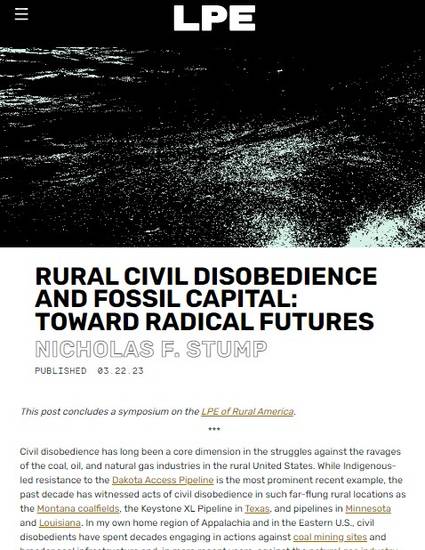
Article
Rural Civil Disobedience and Fossil Capital: Toward Radical Futures
Law & Political Economy Blog
(2023)
Abstract
Civil disobedience has long been a core dimension in the struggles against the ravages of the coal, oil, and natural gas industries in the rural United States. While Indigenous-led resistance to the Dakota Access Pipeline is the most prominent recent example, the past decade has witnessed acts of civil disobedience in such far-flung rural locations as the Montana coalfields, the Keystone XL Pipeline in Texas, and pipelines in Minnesota and Louisiana. In my own home region of Appalachia and in the Eastern U.S., civil disobedients have spent decades engaging in actions against coal mining sites and broader coal infrastructure and, in more recent years, against the natural gas industry. How should we make sense of anti-fossil fuel civil disobedience in rural spaces? In this brief post, I will contrast two orientations—the standard liberal analysis of civil disobedience and an approach that that is grounded in a framework informed by critical legal theory—and argue that the latter provides the more powerful approach. In particular, the radical approach allows us to include recent acts of resistance that focus on property-destruction and movement-building within the ambit of civil disobedience.
Keywords
- Civil Disobedience,
- Critical Legal Theory,
- Law and Marxism,
- Fossil Capital
Disciplines
Publication Date
March 22, 2023
Citation Information
Nicholas F. Stump. "Rural Civil Disobedience and Fossil Capital: Toward Radical Futures" Law & Political Economy Blog (2023) Available at: http://works.bepress.com/nicholas-stump/29/
